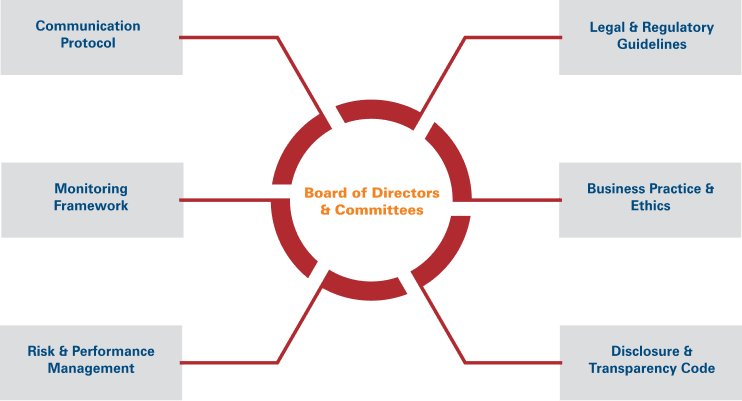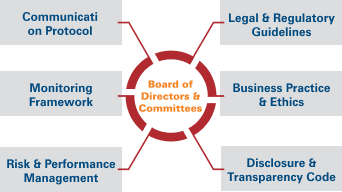Governance Philosophy
At ICICI Bank, we are committed to maintain the highest standards of governance in the conduct of our business and continuously strive to create lasting value for all our stakeholders. We focus on maintaining comprehensive compliance with the laws, rules and regulations that govern our business and promote a culture of accountability, transparency and ethical conduct across the Bank.
Competency and Diversity Matrix of the Board of Directors
The corporate governance framework at ICICI Bank is based on an effective independent Board, the separation of the Board’s supervisory role from the executive management and the constitution of Board Committees to oversee critical areas.
- Independent Directors constitute an overwhelming majority on most Board Committees
- The Chairman of the Board is an Independent Director. Most Board Committees are chaired by Independent Directors too
- Composition of the Board and Committees fulfil all applicable regulatory and legal requirements
Anchor Role of the Board Governance, Remuneration and Nomination Committee (BGR&NC) in Preserving and Enhancing Governance
Beyond the critical role played in recommending Board nominations including selection of Independent Directors, supporting optimal Board and Senior Management composition and other statutory duties that it performs and delivers, the distinctive feature of the BGR&NC of the Bank is its focus to achieve alignment of compensation philosophy with prudent risk taking. Under its guidance, a regulatorily aligned Compensation Policy has been implemented, which is intended to drive meritocracy within the framework of prudent risk management. This approach has been incorporated in the Compensation Policy.
The key elements of the Policy are:
Key Performance Indicators (KPIs) for Wholetime Directors (WTDs) and equivalent positions, along with the organisational performance norms for bonus based on the financial and strategic plan, are approved by the Board. The KPIs include both quantitative and qualitative aspects. The BGR&NC assesses organisational performance and based on its assessment, it makes recommendations to the Board regarding compensation for WTDs, senior management and equivalent positions and bonus for employees, including senior management and key management personnel.
The Bank seeks to achieve a prudent mix of fixed and variable pay, with a higher proportion of variable pay at senior levels and no guaranteed bonuses. Compensation is sought to be aligned to both financial and non-financial indicators of performance including aspects like risk management and customer service. In addition, the Bank has an employee stock option scheme aimed at aligning compensation to long term performance through stock option grants that vest over a period of time. Compensation of staff in financial and risk control functions is independent of the business areas they oversee and depends on their performance assessment.
The Board approves the risk framework for the Bank. The business activities of the Bank are undertaken within this framework to achieve the financial plan. The risk framework includes the Bank’s risk appetite, limits framework and policies and procedures governing various types of risk. KPIs of WTDs and employees incorporate relevant risk management related aspects. For example, in addition to performance targets in areas such as risk calibrated core operating profit (profit before provisions and tax excluding treasury income), performance indicators include aspects such as asset quality. The BGR&NC takes into consideration all these aspects while assessing organisational and individual performance and making compensation-related recommendations to the Board.
Risk Management Framework
The Bank’s risk management framework is based on a clear understanding of various risks, disciplined risk assessment and measurement procedures and continuous monitoring. The policies and procedures established for this purpose are continuously benchmarked with international best practices. The Board of Directors has oversight on all the risks assumed by the Bank. Specific Committees have been constituted to facilitate focused oversight of various risks, as follows:
Board Monitored Policies
ICICI Bank’s corporate governance philosophy encompasses regulatory and legal requirements, which aim at achieving a high level of business ethics, effective supervision and enhancement of value for all stakeholders.
To engender this philosophy, the Bank’s Corporate Governance Framework has been designed. The framework encompasses a large spectrum of policies, codes and procedures which have been implemented through Board Committees, well supported by people, process and technology. There is a continuous mechanism of communication aimed to achieve effective permeation and implementation both, within the organisation and through web based public disclosures where required, underlining the culture of disclosure and transparency, reflecting global best practices. This is actively monitored by a robust system of compliance monitoring, risk oversight and performance management, all backed by comprehensive audit supervision.
The policies, codes and procedures that define our Corporate Governance Framework are depicted below:
The Bank is committed to socially responsible conduct and ensure highest standards of integrity and ethics in its engagement with stakeholders, including customers, shareholders, employees and society. The Bank follows a no-discrimination policy towards employees and has a strong mechanism for dealing with complaints on harassment or discrimination. It has special policies for its women employees extending support to meet their life-stage needs. The Bank’s relationship with customers is based on the principle of “Fair to Bank, Fair to Customer” and strives to ensure fair features and pricing in the products and follows strong governance standards in addressing customer complaints and redressal.
















